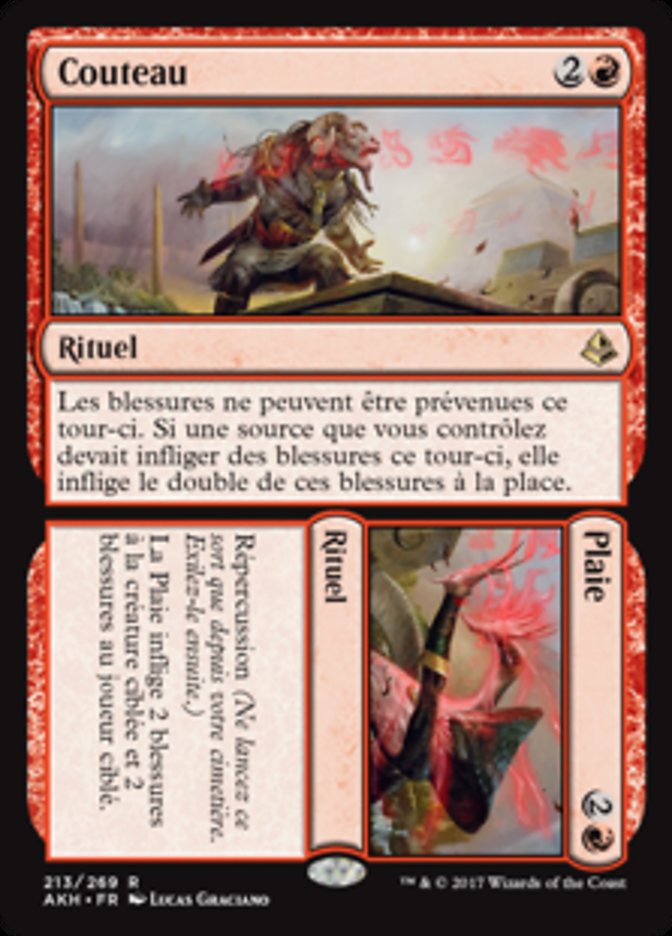
Couteau {2}{R}
Rituel
Les blessures ne peuvent être prévenues ce tour-ci. Si une source que vous contrôlez devait infliger des blessures ce tour-ci, elle inflige le double de ces blessures à la place.
Plaie {2}{R}
Rituel
Répercussion (Ne lancez ce sort que depuis votre cimetière. Exilez-le ensuite.)
La Plaie inflige 2 blessures à la créature ciblée et 2 blessures au joueur ciblé.
Illustrated by Lucas Graciano
- Standard
- Not Legal
- Alchemy
- Not Legal
- Pioneer
- Legal
- Explorer
- Legal
- Modern
- Legal
- Historic
- Legal
- Legacy
- Legal
- Brawl
- Legal
- Vintage
- Legal
- Timeless
- Legal
- Commander
- Legal
- Pauper
- Not Legal
- Oathbreaker
- Legal
- Penny
- Legal
Toolbox
Buy This Card
Notes and Rules Information for Couteau // Plaie:
- Only the English version of a Magic card receives Oracle updates and errata. View this card in English. (Scryfall note)
- If a creature with trample you control would deal combat damage to a blocking creature this turn, you must assign its unmodified damage. For example, a 3/3 creature with trample blocked by a 2/2 creature can only have 1 damage assigned to the defending player. It will then deal 4 damage to the blocking creature and 2 to the defending player. (2017-04-18)
- If an effect such as that of Chandra’s Pyrohelix asks you to divide damage among targets, you must divide the unmodified damage before doubling it. (2017-04-18)
- If you cast two Insults in one turn, damage dealt by sources you control this turn will be multiplied by 4. If you cast three Insults, it will be multiplied by 8, and so on. How rude. (2017-04-18)
- Split cards with aftermath have a new frame treatment—the half you can cast from your hand is oriented the same as other cards you’d cast from your hand, while the half you can cast from your graveyard is a traditional split card half. This frame treatment is for your convenience and has no rules significance. (2017-04-18)
- All split cards have two card faces on a single card, and you put a split card onto the stack with only the half you’re casting. The characteristics of the half of the card you didn’t cast are ignored while the spell is on the stack. For example, if an effect prevents you from casting green spells, you can cast Destined of Destined // Lead, but not Lead. (2017-04-18)
- Each split card is a single card. For example, if you discard one, you’ve discarded one card, not two. If an effect counts the number of instant and sorcery cards in your graveyard, Destined // Lead counts once, not twice. (2017-04-18)
- Each split card has two names. If an effect instructs you to choose a card name, you may choose one, but not both. (2017-04-18)
- While not on the stack, the characteristics of a split card are the combination of its two halves. For example, Destined // Lead is a green and black card, it is both an instant card and a sorcery card, and its converted mana cost is 6. This means that if an effect allows you to cast a card with converted mana cost 2 from your hand, you can’t cast Destined. This is a change from the previous rules for split cards. (2017-04-18)
- If you cast the first half of a split card with aftermath during your turn, you’ll have priority immediately after it resolves. You can cast the half with aftermath from your graveyard before any player can take any other action if it’s legal for you to do so. (2017-04-18)
- If another effect allows you to cast a split card with aftermath from any zone other than a graveyard, you can’t cast the half with aftermath. (2017-04-18)
- If another effect allows you to cast a split card with aftermath from a graveyard, you may cast either half. If you cast the half that has aftermath, you’ll exile the card if it would leave the stack. (2017-04-18)
- A spell with aftermath cast from a graveyard will always be exiled afterward, whether it resolves, it’s countered, or it leaves the stack in some other way. (2017-04-18)
- You can’t cast Injury unless you target both a creature and a player. If one target is illegal as Injury resolves, the spell deals damage to the remaining legal target. (2017-04-18)
- Once you’ve started to cast a spell with aftermath from your graveyard, the card is immediately moved to the stack. Opponents can’t try to stop the ability by exiling the card with an effect such as that of Crook of Condemnation. (2017-07-14)